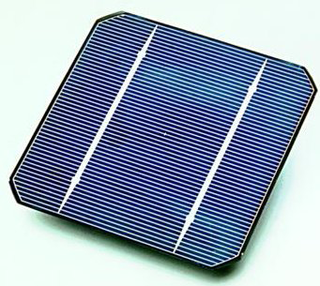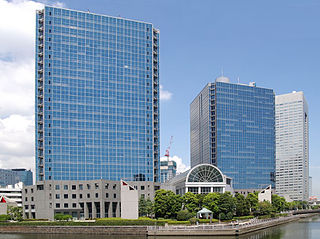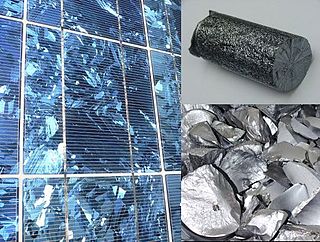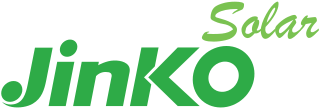
A solar cell, or photovoltaic cell, is an electrical device that converts the energy of light directly into electricity by the photovoltaic effect, which is a physical and chemical phenomenon. It is a form of photoelectric cell, defined as a device whose electrical characteristics, such as current, voltage, or resistance, vary when exposed to light. Individual solar cell devices are often the electrical building blocks of photovoltaic modules, known colloquially as solar panels. The common single junction silicon solar cell can produce a maximum open-circuit voltage of approximately 0.5 volts to 0.6 volts.

SolarWorld is a German company dedicated to the manufacture and marketing photovoltaic products worldwide by integrating all components of the solar value chain, from feedstock (polysilicon) to module production, from trade with solar panels to the promotion and construction of turn-key solar power systems. The group controls the development of solar power technologies at all levels in-house.

The Renewable Energy Corporation (REC) is a solar power company with headquarters in Singapore. REC produces silicon materials for photovoltaics (PV) applications and multicrystalline wafers, as well as solar cells and modules. It is a wholly-owned subsidiary of Reliance New Energy Solar.
Nanosolar was a developer of solar power technology. Based in San Jose, CA, Nanosolar developed and briefly commercialized a low-cost printable solar cell manufacturing process. The company started selling thin-film CIGS panels mid-December 2007, and planned to sell them at 99 cents per watt, much below the market at the time. However, prices for solar panels made of crystalline silicon declined significantly during the following years, reducing most of Nanosolar's cost advantage. By February 2013 Nanosolar had laid off 75% of its work force. Nanosolar began auctioning off its equipment in August 2013. Co-Founder of Nanosolar Martin Roscheisen stated on his personal blog that nanosolar "ultimately failed commercially." and that he would not enter this industry again because of slow-development cycle, complex production problems and the impact of cheap Chinese solar power production. Nanosolar ultimately produced less than 50 MW of solar power capacity despite having raised more than $400 million in investment.

First Solar, Inc. is an American manufacturer of solar panels, and a provider of utility-scale PV power plants and supporting services that include finance, construction, maintenance and end-of-life panel recycling. First Solar uses rigid thin-film modules for its solar panels, and produces CdTe panels using cadmium telluride (CdTe) as a semiconductor. The company was founded in 1990 by inventor Harold McMaster as Solar Cells, Inc. and the Florida Corporation in 1993 with JD Polk. In 1999 it was purchased by True North Partners, LLC, who rebranded it as First Solar, Inc.
LDK Solar Co. Ltd., located in Xinyu City, Jiangxi province in the People's Republic of China, manufactures multicrystalline solar wafers used in solar cells, and provides wafering services for both monocrystalline and multicrystalline wafers. Their distribution network for solar products covered over 43 distributors and wholesalers across 15 countries.
China Sunergy is a Chinese solar cell products manufacturer based in Nanjing, Jiangsu. The company specializes in creating solar cells from silicon wafers. China Sunergy has a major customer base in China, but also sells their products internationally. On May 17, 2007, the company began producing both monocrystalline and multicrystalline silicon solar cells. In 2012 the annual production of the cells were 1 GW and PV modules 1.2 GW. After listing as a NASDAQ Company in 2007, in 2013 May 23 China Sunergy opened its first international manufacturing base in Turkey. Turkey factory has the biggest solar cell and module capacity among both in Turkey and Europe. CSUN currently is the only Chinese solar cells and module manufacturer with a manufacturing base in Europe. Located in Tuzla Free Trade Zone, Istanbul, CSUN (Turkey) is in progress of building its second factory in Turkey within 2015. CSUN has been recognized as a Tier 1 module supplier by the Bloomberg New Energy Finance (BENF) PV Module Maker Tiering System on 23 March 2014.

Yingli, formally Yingli Green Energy Holding Company Limited -. Yingli Green Energy Holding Company Limited, known as "Yingli Solar," is a solar panel manufacturer. Yingli Green Energy's manufacturing covers the photovoltaic value chain from ingot casting and wafering through solar cell production and solar panel assembly. Yingli's photovoltaic module capacity is 4 GWs.
Bosch Solar Energy AG was a German solar wafer and solar cell manufacturer, based in Erfurt, which specialized in crystalline silicon-based photovoltaic (PV) products, as well as thin-film modules using amorphous silicon and CIGS absorber materials. The company consisted of the various divisions for silicon, wafers, solar cells and modules, research and production facilities in Germany and France and plans were made to open a production line in Malaysia. It has been listed on the German stock exchange since 30 September 2005 and on 19 December 2005 its shares were admitted to the TecDAX. The enterprise was founded in 1997 as ErSol Solarstrom GmbH & Co. KG.
SunEdison, Inc. is a renewable energy company headquartered in the U.S. In addition to developing, building, owning, and operating solar power plants and wind energy plants, it also manufactures high purity polysilicon, monocrystalline silicon ingots, silicon wafers, solar modules, solar energy systems, and solar module racking systems. Originally a silicon-wafer manufacturer established in 1959 as the Monsanto Electronic Materials Company, Monsanto sold the company in 1989.
Monocrystalline silicon, more often called single-crystal silicon, in short mono c-Si or mono-Si, is the base material for silicon-based discrete components and integrated circuits used in virtually all modern electronic equipment. Mono-Si also serves as a photovoltaic, light-absorbing material in the manufacture of solar cells.

A thin-film solar cell is a second generation solar cell that is made by depositing one or more thin layers, or thin film (TF) of photovoltaic material on a substrate, such as glass, plastic or metal. Thin-film solar cells are commercially used in several technologies, including cadmium telluride (CdTe), copper indium gallium diselenide (CIGS), and amorphous thin-film silicon.
Topray Solar is a vertically integrated solar energy company with global presences in Africa, Europe, Asia and North America. It is a publicly listed company on China Shenzhen Stock Exchange with a market cap over 1 Billion USD. Topray Solar is a first-tier player in the renewable energy industry with multiple manufacturing bases and several oversea subsidiaries.
1366 Technologies was a company based in Bedford, Massachusetts that developed a technique to produce silicon wafers by casting them in their ultimate shape directly in a mold, rather than the prevailing standard method in which wafers are cut from a large ingot. In July 2021, the company merged with Dallas-based Hunt Perovskite Technologies to form a new company, CubicPV. The company's management predicted that the new approach will be able to produce wafers at half the cost of current methods. The company's name was a reference to the solar constant, representing the watts of solar energy that hits each square meter outside of earth's atmosphere.

SUMCO Corporation is a Japanese semiconductor company, manufacturing silicon wafers for semiconductor manufacturers worldwide. The company was established in 1999 as a joint venture between Mitsubishi Materials Corporation and Sumitomo Metal Industries and as of 2013 is the second largest silicon wafer producer in the world, after Shin-Etsu Handotai, with a market share of 30%.

Polycrystalline silicon, or multicrystalline silicon, also called polysilicon, poly-Si, or mc-Si, is a high purity, polycrystalline form of silicon, used as a raw material by the solar photovoltaic and electronics industry.

JinkoSolar Holding Co., Ltd. is currently the world's largest solar panel manufacturer, shipping 11.4 GW of modules in 2018. Headquartered in Shanghai, China, the company started out as a wafer manufacturer in 2006 and went public on the New York Stock Exchange in 2010.

LONGi Green Energy Technology Co. Ltd. or LONGi Group (隆基股份), formerly Xi'an Longi Silicon Materials Corporation, is a major Chinese manufacturers of photovoltaic solar modules and a developer of solar power projects. LONGi is the world largest manufacturer of monocrystalline silicon wafers and is listed on the Shanghai Stock Exchange.
Meyer Burger, headquartered in Thun, (Switzerland), is a globally active mechanical engineering company, which is primarily known for its production facilities in the photovoltaic industry. Meyer Burger develops and produces systems with which solar cells can be manufactured and electrically connected for use in solar modules. The focus is on heterojunction technology (HJT) and the exclusive SmartWire Connection Technology (SWCT). High-precision measuring systems for silicon wafers, solar cells and modules are also offered. From spring 2021, the company will produce solar cells and solar modules itself at two locations in Germany.








